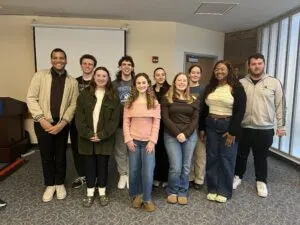Making Change: First-Generation Students
First-generation students make up about 47% of the Worcester State student body. Learn more about first-gen students by reading below.
What is a First-Generation Student?
First-generation is a term typically used to describe a student who is the first to attend college in their family or is the child of a parent/parents who did not complete a 4-year college degree. First-generation students can vary in identities, ages, and backgrounds but are often working students from the local area and commonly face challenges navigating the completion of their degree. Research discussing first-generation students suggests that first-generation students graduate at lower rates and benefit from resources such as academic advising, faculty support both in and out of the classroom, and student services to support educational success and a sense of belonging. It is common for first-generation students to need extra help navigating what is available. Worcester State University is committed to supporting first-generation students.
What are some tips for First Generation students?
Learn About Your Resources
WSU offers an assortment of class modalities including online, asynchronous, and evening offerings. Options can help first-generation students fit their academic life into their schedules. Resources for navigating college can be incredibly beneficial and include one-on-one meetings with an Academic Advisor or reviewing written resources such as the Guide to Academic Affairs (linked below). Awareness of resources, even when not always needed, can benefit first-generation students by providing the knowledge of where to look when support is necessary. Tutoring services at WSU are available to all students and can alleviate the stress of challenging courses with additional support. All services are free of charge for students.
Find Community
First-generation college students feel more connected to their institutions when they have a community of support and a strong sense of belonging. Student services that provide opportunities to connect students with others are readily available at WSU. The Office of Student Involvement and Leadership Development offers over 40 clubs and organizations that students can join and find a community around common interests. Members of the OSILD staff can assist students in matching them with the right organization or involvement opportunity. The Office of Multicultural Affairs provides spaces and events for students of different backgrounds to connect. The Beninda Center for Civic Engagement can connect students with community projects outside Worcester State. WSU has a new student organization for first-generation students, First Generation Nation. This organization’s mission is to support the needs of and provide a community for other students who identify as first-generation. These opportunities are only a few that offer a sense of connection on the peer-to-peer level and help students establish positive relationships with university staff they can look to for support.
Build Leadership Skills & Advocate
First-generation students often have an anxious approach when looking to advocate for their needs. There is commonly a fear that they will not be heard or taken seriously if their communication skills or knowledge of the college process is on the same level as their peers. Worcester State University provides many leadership development opportunities to help students build the skills needed to feel more confident in communication, decision-making, and using their natural talents to succeed on campus and in their future career endeavors. Programs such as the Circles of Leadership and the annual Leadership Symposium offer students the chance to practice these skills while connecting with other students looking to build the same skills. These programs are free and accessible to all students.
Take Care of Mental Health
Frequently, first-generation students are students whose home environment is not always understanding or, at times, not supportive of the student’s educational goals and necessities. This, along with academic, social, and societal pressures, takes a toll on a first-generation student’s mental health. For any student, a negative mental state can result in academic challenges, social isolation, and a decline in physical health. Counseling Services provides free services for students, including regular therapy or occasional mental health support. With supportive counselors and accessible resources, students can maintain positive mental health and well-being.



